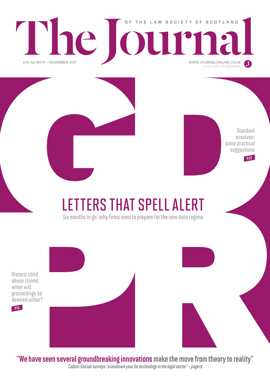President's column

LGBT, LGBT+, LGBTI, LGBTQ, LGBTQI. It is easy to be confused by acronyms. I knew the first but had to have the rest explained to me. Honestly, I had to have the others explained to me. In our recent #theseareourprinciples campaign we chose to use LGBT+ because we’ve been told by our GLASS network colleagues that it is the most inclusive acronym. The most surprising was what “Q” stood for. It was originally used as a term of hate, but now others want to reclaim it. Whatever the rights and wrongs of its use, I cannot bring myself to write it down for fear of offending some of our LGBT+ members.
But jargon is hardly unique to the LGBT+ community. Far from it! All professions talk in jargon and have their special codes. In our own profession we have SLAB, SSDT, SLCC – and try having a conversation with a health professional about a client. I’ve given up trying to work out what they are on about and just ask to avoid mistakes. We should aim for clarity and understanding.
At the International Bar Association recently, I decided to continue my education on equality and diversity and attended a panel on whether or not the laws in some states that are still listed as “sodomy” should be considered crimes against humanity. It’s primarily a carry- over from the days of the British Empire, with many of the nations that were formerly part of the Empire, including large tracts of Africa and the Caribbean – much of what is now the Commonwealth – having legal systems rooted in English law. Some countries still retain that law and in places it carries a death penalty. Interestingly, at one point several centuries ago France removed it from their criminal code so the crime does not exist in any system based on French imperial law, including Germany.
Time to speak out
No decision was made at the session itself on whether such laws are a crime against humanity, but it made me question whether we should be more vocal on this. It was wonderful to see so many from across the profession embrace #theseareourprinciples and I am proud of our part in it, but it is just a start. LGBT+ rights are human rights. It should matter to us if our LGBT+ friends and colleagues are mistreated, denied rights, or criminalised, whether we are LGBT+ ourselves or not. We should speak out against injustice – whether it be here in Scotland or elsewhere in the world.
Equality and diversity should be part of everything we do. We are a diverse profession and diversity has been our motto since day one. (Nothing human is alien to us, after all.) But too many talented people do not reach the levels they want to reach.
When I was at the opening of the English & Welsh legal year I attended a session on equality and diversity and how to redress imbalance. I could see from the procession of the judiciary in their colourful robes that gender imbalance remains an issue. It is here in Scotland too. We published – some time ago now – recommendations to improve gender diversity in the judiciary.
I’ve always believed in meritocracy in public appointments, but there is clearly an issue with the lack of successful female candidates at certain levels. The talent isn’t lacking – there are so many wonderful female lawyers in both branches of the profession – but there seems to be a bottleneck at entrance to the judiciary. Why are women less likely to apply and less likely to be successful in judicial appointment?
Looking back 40 years ago, my LLB class was equal in terms of gender. I still see a fair few of my male colleagues as partners in firms, but it is harder to find my female classmates in the profession. We consistently hear that change is inevitable; that change will come in time. It’s had time. We need to be doing more to encourage gender balance and diversity (and I’d include our equality standards in this) to help people reach their potential. And who doesn’t want that?
There is much to think about and more to do, but until next month, TTFN.
In this issue
- Immigration detention: a case of overuse
- Sexual harassment: don't suffer in silence
- Child disputes: a quicker way through?
- Brexit: where are we now and what happens next?
- Reading for pleasure
- Opinion: Claire McKee
- Book reviews
- Profile
- President's column
- ScotLIS: the citizens' tool
- People on the move
- People matter
- Historic abuse: the fairness matrix
- Landmark year in legal IT
- Sentence, but no full stop
- Opening up arbitration
- Making the agent pay
- Equal pay: beware the mass claims
- Dealing with conflict
- Claims outside the rules
- Pension transfers – history repeating itself?
- Last instructions
- Scottish Solicitors' Discipline Tribunal
- Standard missives: an unachievable dream?
- SOLAR powered
- Disability rights
- Law reform roundup
- Too hard a drive?
- Settlement: can you avoid cheques?
- Q & A corner
- When 25 is the new 35
- Sorry; not sorry
- Ask Ash
- Plan sets ambitious 2017-18 targets
- Letting agents: prepare to register
- Paralegal pointers
- A way to make an impact






